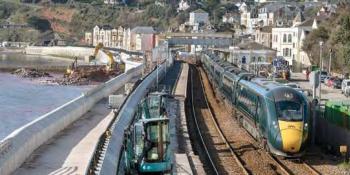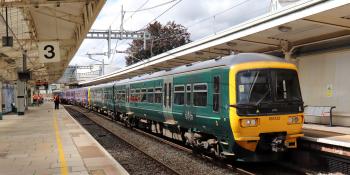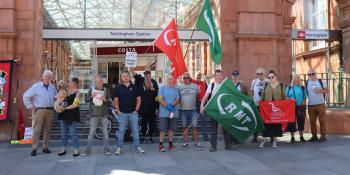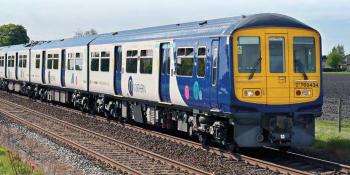
Staff at Network Rail and 14 Train Operating Companies staff in the RMT union were due to hold three more strikes over pay and job security on 27 July and August 18/20, while drivers in ASLEF working for Arriva Rail London, Chiltern Railways, Greater Anglia, Great Western, Hull Trains, LNER, Southeastern; and West Midlands Trains will strike on Saturday 30 July. ASLEF had already held a strike at Greater Anglia on Saturday 2 July, with another due to follow on 23 July, while strikes were due to be held on Hull Trains on 16-17 and 23-24 July.
The series of strikes follow three by RMT members on 21, 23 and 25 June which caused large scale disruption across the network, even where no ballots had taken place, due to the absence of signallers.
RMT General Secretary Mick Lynch said progress had been made on compulsory redundancies (Network Rail plans to axe around 1,800 maintenance jobs), but that his members would still face a real terms pay cut under the infrastructure manager’s latest offer.
He claimed train operators ‘remain stubborn and are refusing to make any new offer which deals with job security and pay’, adding that strike action was ‘the only course open to us’.
‘The public who will be inconvenienced by our strike action need to understand that it is the Government's shackling of Network Rail and the TOCs that means the rail network will be shut down for 24 hours. We remain open for further talks.’
Mr Lynch told media that the union had deliberately avoiding striking during the Commonwealth Games. Having received an offer from TOCs which Mr Lynch said ‘made no offer whatsoever on pay’, the General Secretary said 27 July was the only day before the Games the union could pick while giving two weeks’ notice as required by law.
For ASLEF, General Secretary Mick Whelan said his members had been ‘forced into this position’, adding that train operators ‘are offering us nothing, saying their hands have been tied by the government. That means, in real terms, with inflation running ahead at 9%, 10%, and even 11% this year, according to which index you use, that they are being told to take a real terms pay cut.’
Ballots at Avanti West Coast, CrossCountry and Direct Rail Services are still open. However, drivers at ScotRail have voted to accept a pay offer of 5% and a revenue share premium. The decision follows the union’s recommendation that members accept the offer: ScotRail was holding talks with ASLEF to resume its full timetable, which has been heavily disrupted since May by drivers not working overtime and on rest days. The union has agreed pay deals this year with with DB Cargo, Eurostar, Freightliner Heavy Haul and Intermodal, GB Railfreight, Merseyrail, MTR Elizabeth line and Pre Metro Operations.
NR has offered RMT members a two-year deal with a 4% rise in the first year backdated to January this year, 2% in year two, with a further 2% if modernisation reforms milestones are met. Chief Executive Andrew Haines claimed the RMT wanted a pay settlement ‘to be funded either by more taxpayer support or higher passenger fares, neither of which we think are fair’.
Mr Haines described the announcement of the additional strike as ‘incredibly frustrating’, and ‘deeply worrying that these strikes have clearly been designed to disrupt spectators heading to the opening of the Commonwealth Games in Birmingham on 28 July’.
Representing train operators, the Rail Delivery Group said its members want to give staff a pay rise, but that working practices would have to change, including making Sundays part of the standard working week.
‘Instead of staging more counterproductive strikes, we ask the RMT to come back to the table so we can deliver a deal that works for our people, our passengers and for taxpayers,’ a spokesman said.
A second ballot by the RMT of Govia Thameslink Railway staff resulted in 80% voting in favour of strikes on a turnout of 57.5%, meeting the legal threshold for action.




